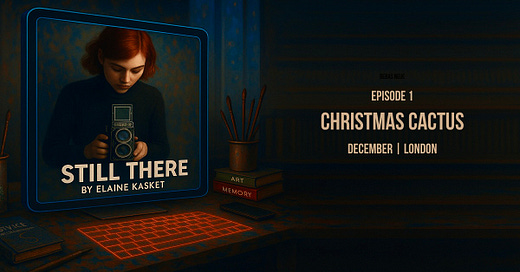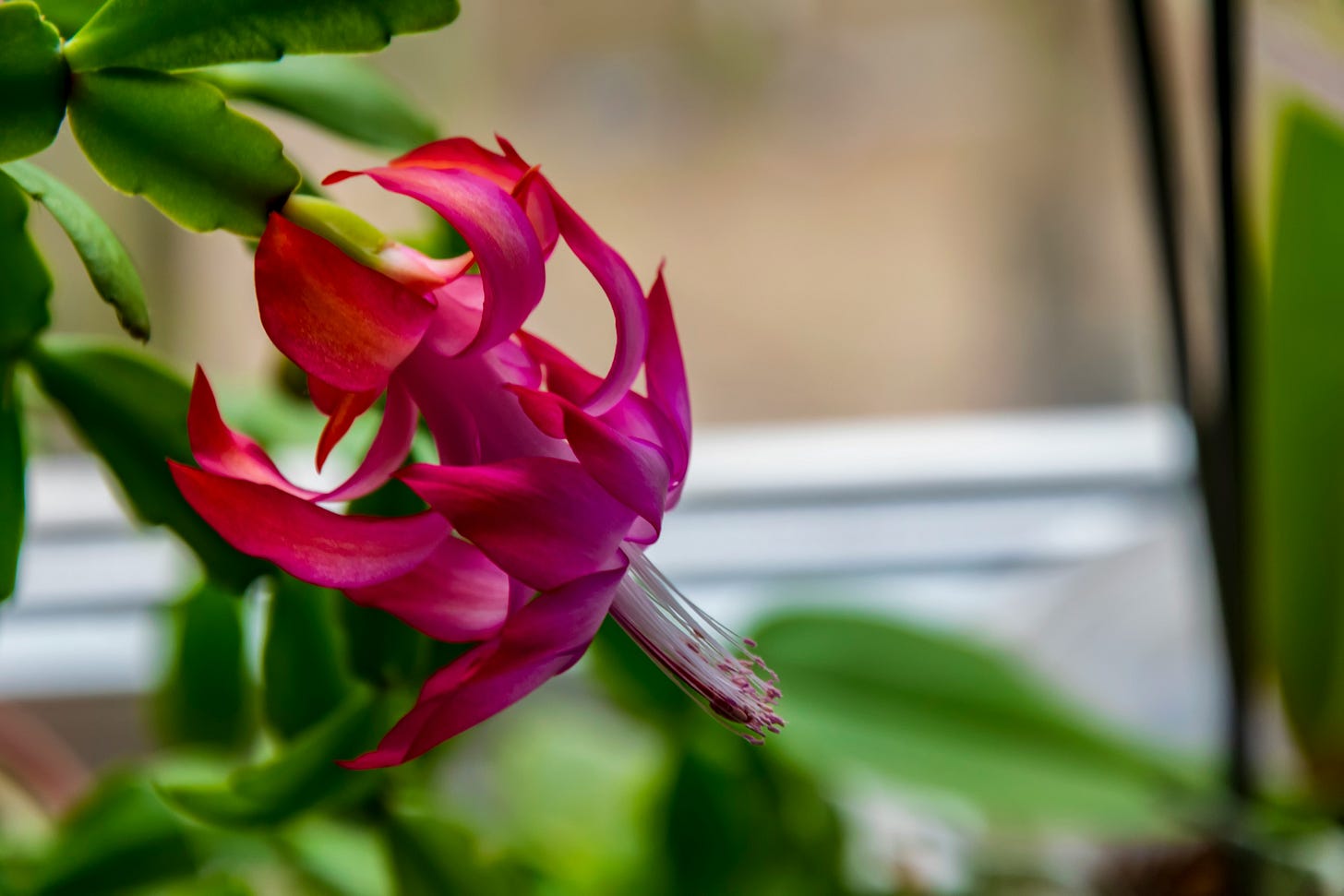On the morning the call came, the Christmas cactus burst into flower.
Every prior December its buds had fallen before they could blossom, leaving the plant naked. Discovering them lying pathetically at the base of the pot, Cassandra would sweep the bundles of unrealised promise into her palm and carry them to their burial ceremony in the kitchen bin, hoping things would be different next year.
But five winters had come and gone since Olivia had presented it to her, and Cassandra hadn’t yet managed to get the cactus dressed up for the holidays. Her husband laughed at her. Such a simple thing, Paul said, for a person to repeatedly fail at. Once a plant killer, always a plant killer. But she hadn’t killed the cactus. Her ineptitude had prevented it from reaching its potential, that's all.
Her head was so sleep-fogged that the flowers could have been a wish-fulfilment dream, one last hallucination before she was properly awake. But after her first swallow of strong coffee, they were still there, spots of brightness in the pale sun filtering through the window. Creeping up, Cassandra extended a careful finger to touch one, waiting for it to faint onto the table like the ones before. But the bloom was too robust to fall, its stamen thrusting boldly from a red-rimmed opening at the centre of the flower, tipped with a drop of fuchsia.
Photo by Kostiantyn Vierkieiev on Unsplash
Cassandra flushed. She'd done it. She’d transformed this alien, angular thing into a voluptuous beauty, the gift finally worthy of Olivia, its giver.
Her grandmother’s clock on the sideboard clanged eight. On a Sunday morning during peak holiday-period season, most of London would be hung over, although Olivia hadn’t seemed well, had avoided festive cocktails. Either way, her friend would still be in bed with Jack, but Cassandra couldn’t wait to share her redemption.
She cared little for keeping up with the latest models, but her old phone was still capable of instantaneously producing what it judged to be the perfect image, identifying the most objectively beautiful flower and sharpening its focus there, all else receding into blurriness. When Olivia woke, she would see the photo and ring straightaway. After three decades of friendship, Cassandra could guess what she’d say, predict the exact pitch of her voice.
Holy shit, it’s a Christmas miracle!
In the millisecond before she hit send, the phone vibrated to life in her hand.
For years afterwards, her strongest sense memory of that moment would be its smooth, cool surface against her cheek.
‘I was just sending a photo to Olivia,' she said, too loudly. Remembering Paul, she dropped her voice to a whisper. 'You'll never guess!'
A moment’s silence hung between them.
'Jack?' she said.
She heard him then: one deep, shuddering breath.
'Olivia's dead.'
Cassandra, her eyes still fixed on the extravagant flower, received these sounds into her ear. Five syllables, delivered in even beats, like a line of haiku.
Paul was still asleep. Alone, she stumbled over the last step as she navigated uncertainly onto the path to her studio. It lay at the bottom of the garden some 30 metres from the house, partially concealed by an overgrown green- and gold-leafed hedge. She was barely cognisant of leaving the house to go there, but she was increasingly aware of not having put on her coat.
She'd struggled with the lock for so long that the cold air had numbed her fingers. Perhaps rust or ice had frozen it. Applying pressure, she thought she felt the key move without turning, its metal threatening to snap.
Wringing the feeling back into her fingers, she whipped round and scanned the upper windows of the house in a lather of frustration but saw no movement there, only the twitch of a curtain next door. Someone was having a normal morning, munching on the chocolate panettone she had gifted their near neighbours that Christmas and enjoying the spectacle of wild-haired Cassandra Wood, inappropriately attired for the weather in a robe and slippers, kicking a door and cursing the heavens.
Jack had sounded far away and hollow, as though he were stuck down the bottom of a well. 'Her portrait,' he said. 'The one you did. I mean, we have the smaller print. I have it. It's lovely, but…'
She had scarcely followed him, had only been able to rewind and replay his first sentences in her head, trying to comprehend them through repetition, searching for clues in the sounds.
Olivia's dead. Her heart. Post viral, or congenital, they don’t know. Olivia's dead. Her heart...
Long ago, she'd offered Olivia the painting after the exhibition's finish, but Olivia had refused. She didn’t fancy being ogled by herself from her sitting-room wall.
'For this...for the event, I thought...' Jack said. 'And maybe I could keep it for a while after…?’
'Yes. No. Of course,' Cassandra said. 'The original has more life.' She winced, but he was kind.
'Exactly. You understand,' he said. 'So much life. Like when I first saw her.'
He gasped, and his breathing changed. Her heart clenched to imagine him in tears.
'You shouldn't be alone,’ she said. ‘I'll bring it. We’ll bring it. We'll come today.’
'Would you?' he said, sniffling.
Under a violent push from her shoulder, the door to the studio gave way. On its path to the ground, her falling body tore through a spider's web slung between two folded easels. Rolling onto her back on the ice-cold concrete floor, she panted and stared through the clouds of her breath at roof lights nearly completely obscured with wood-pigeon droppings and detritus from the neighbours’ perpetually shedding cedars.
Cassandra hadn’t seen the portrait for years but remembered every brushstroke. Olivia's pre-Raphaelite hair rippling in red-gold waves against her black turtleneck. To her left, bottles of chemicals, utilitarian sinks, plastic tubs. To her right, an old large-screen Mac, memory chips scattered on the desk. Dirty and clean, analogue and digital, old and new. Olivia in the centre, a foot in each camp, legs spread wide in a bold inverted V. A vintage Rolleiflex camera with its viewfinder at the top, held at chest level. Olivia’s mischievous upward glance. Behind her, strips of negatives dangling from the ceiling like party streamers.
Clambering to her feet, Cassandra picked her way around paint-splattered stools and half-finished canvases she didn't remember starting. When she opened the door to the back room, its thermostat perpetually set at 20 degrees, it was like stepping off a plane into a country far from England.
In this disused garden building was everything of any worth she'd ever done. Her ‘Room of One’s Own’ series, exhibited years ago now, had been both the beginning and the end of the story. Paul had resisted investing in climate control for what was little more than a shed, he said, but she’d meekly explained that if her most precious works became damp or cold or hot, they might be ruined. He’d laughed and kissed her, called her a dragon guarding her cave of treasures. She’d pushed it, they’d argued, and she’d wept. Two days later the HVAC workers arrived with their van full of pipes and vents.
They were always like that, she and Paul.
The twelve women she’d painted for the exhibition slept in comfort now, swaddled in archival packing material. Their boxes lay flat on wire shelves, titles printed in black Sharpie on the outward-facing edges. Cassandra crouched to find Darkroom and pulled at it with one hand. She'd forgotten the weight of the frame.
I don't understand, Jack. When?
Late last night, at home. She was on the floor of the bedroom. I did CPR, but… nothing. Just nothing.
Her grasping fingers detected an irregularity in the box, a bit of gnawed cardboard, and her heart jump started, as though it had been stalled since Jack's call. Probing the chewed place in a panic, she found the damage was only surface deep. No harm done yet, but she could imagine the debate to come. She would propose pest control, and Paul would insist on a 50p trap and a lick of peanut butter. She needn’t navigate that today. It was enough that it was fine, that this most important painting remained undamaged.
After Jack's initial eagerness, he'd said there was no rush, but she couldn't handle the idea of him in a quiet house. She didn’t know how on earth she would reach him, for the painting was too large for their car, and she didn't trust herself behind the wheel anyway. Every noise she made, every scrape and shuffle of her struggle with the box, sounded strangely loud. If she felt like she was dreaming, surely she shouldn’t drive. Paul could do it, but his presence would feel odd. He and Jack had never gelled, and the couple were her friends, really. If it didn’t feel right for him to come in once they’d arrived, they could cross that bridge when they came to it.
She straightened her knees to stand, her breath loud in her head, like the ocean roaring. She did not know what to say to Paul, how to tell him, what to ask for. She couldn’t anticipate his reply. Whatever it was, she didn't want to hear it. She wanted to stay in that room, as perfectly controlled as the air.
As she stepped outside, the chill wind and the sight of Paul in the window of the breakfast room sent every muscle rigid. His expression was bemused, as though he’d caught her in a secret, but his smile faded as she held his gaze. She tried to walk towards him, but her feet were rooted to the spot, and the walk leading to the house seemed unnaturally long, as paths often are in dreams. She watched Paul watching her as she stood trembling in her thin robe, her hand still holding the faulty doorknob.
About the Author
Elaine Kasket ventures into new territory with Still There, her first novel. Known for her nonfiction work, she's now exploring the boundaries between memory, technology, and human connection through fiction. This serialised novel is being released exclusively on Substack, with new installments dropping every Tuesday and Friday. Join the journey from the beginning—subscribe to make sure you don't miss a single episode.







So wonderful! Thank you for doing this.
Beautiful